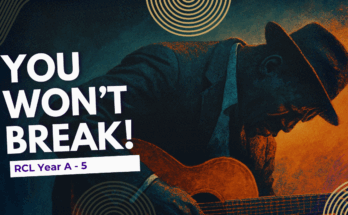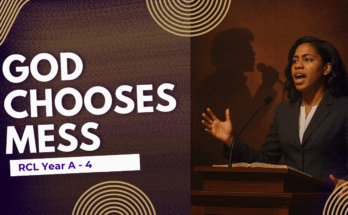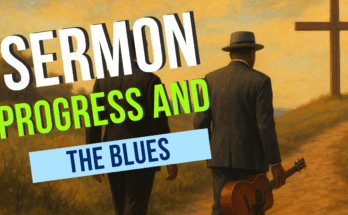As an Amazon Associate I earn from qualifying purchases.
In 2007, the African American community finds itself in a treacherous situation. It is a time when middle class African Americans have more opportunities than many generations before now. African Americans are CEOs, entertainment personalities, and political leaders in both political parties. But during this time of seemingly relative prosperity the masses of the poor among us are still in terrible conditions. While one might argue that visibly some seem to be rising above all limitations, nevertheless there are indications that racism still affects all African Americans to a greater or lesser certain extent. At this time, the 21st century African American preacher must ask the simple question, “How can we be effective preachers of the Gospel?â€
While the times may be different, the African American preacher is called to do what the Black preacher has always done. The Black preacher is still called to give a word of hope and liberation just as our forbearers did in the bellies of ships along the middle passage and in clandestine meetings in the Bush Harbors of the rural south. The Black preacher is still called to follow our mothers and fathers who still preached about a God who hated slavery and loved all of humanity. The Black preacher is still called to have the audacity to say that God is still among the downtrodden as our preachers did during the long days of Jim Crow and the broken promises of freedom. And finally the Black Preacher is still called to do what the best of the Black preaching tradition has always done, namely be a catalyst for both change and hope.
But the question remains, How Can we do this today? The problems seem too big. However, this class has taught me that what we must do is remember. We must look back at the past to gain insight to move into the future. In other words, the Black preacher can preach God’s kingdom into the future only as the Black preacher remembers the Black preachers who have gone on before.
Remember
I am calling for us to remember. One might think that the word “remember†is too passive to help us through the dark and dreary days of contemporary America. Many might think of memory as simply bringing to mind something from the past. However, I am speaking of a specific kind of memory. This type of memory has roots both in the Christian tradition and our African tradition. John McClure refers to a special kind of remembering called anamnesis which “is intended to move a sacred person or event from the past into the present.†This memory is shown in the Eucharistic Prayer that seeks to bring to the present the past actions of Jesus Christ.
Remember What? – The Priest Doctor
The Black Preacher has to remember the preachers who have gone on before if we are to navigate the tumultuous waters of the present into the sun rise of an open future. First, the Black Preacher must remember the African priest-doctor. That priest worked with God to give the community both physical and spiritual healing. We must never distance ourselves form the true physical needs of the communities that God has called us to serve. As we remember the African priest-doctor we will participate in the physical and spiritual healing of our people. We will recognize the need to deal with physical and medical issues like AIDS. We will recognize the need to deal with the reasons why we die not just from bullets shot from guns but from forks found at the dinner table. Our African Worldview forces us to recognize that the whole of our being matters to God.
We must remember by listening to the priest-doctor who is telling us that our physical and spiritual beings are inextricably bound together. We must remember to preach the vital connection between spirituality and physicality including the striking truth of God taking flesh (incarnation). We must remember by taking a page from our holiness ancestors who found truth in the work of John Wesley and the importance of living cleanly and more like God. We must remember that our spiritual birth will not happen without physical ramifications. We must preach holistic health and unity of all creation if we are to listen to the priest-doctor who has helped us so much.
Remember What? – Slave Preacher
 But more than the priest-doctor, we must ever remember the nurturing pastoral role of the great preachers, especially the slave preacher. Our very existence as a people in a land that was hell-bent on destroying us reminds us that the pastoral dimension of the slave preacher was so important. We needed to know that God was with us. We needed to know that God would make a way even though the world looks so terrible. The slave preacher risked life and limb to preach the gospel into a world where Satan was on the throne. The slave preacher went out into the bush harbors to preach even though it was illegal to do so. Our African worldview reminds us that they are still there to awaken the spirit of sacrifice that called forth the need to preach the truth even through terrible times.
But more than the priest-doctor, we must ever remember the nurturing pastoral role of the great preachers, especially the slave preacher. Our very existence as a people in a land that was hell-bent on destroying us reminds us that the pastoral dimension of the slave preacher was so important. We needed to know that God was with us. We needed to know that God would make a way even though the world looks so terrible. The slave preacher risked life and limb to preach the gospel into a world where Satan was on the throne. The slave preacher went out into the bush harbors to preach even though it was illegal to do so. Our African worldview reminds us that they are still there to awaken the spirit of sacrifice that called forth the need to preach the truth even through terrible times.
Like in Christian history, there is also in the African worldview a mindset of all being present at this time. In a sense, we are living with the thoughts and dreams and hopes of the ancestors as well as those of our unborn children in some way. Remembering is simply bringing back to our mind that the dream of equality operative there is here now. So memory is not a passive mental assent but an active decision to live with the past and a recognition that the past is here with us guiding and enlightening us.
Remember What?- The Militant Preacher
Finally, we must never forget that preacher who stood up and told the country that we would be free. We cannot forget the militant-preacher who used the Bible as a weapon for liberation. White America attempted to use the Bible to teach slaves to be obedient. In contrast, the Africans in America looked in the Bible and found in Jesus a fellow traveler in pain. In the doctrine of hell they found a reaffirmation of God’s justice. And in the Bible they found another repository of wisdom of the ancestors. They read the same Bible that was meant to attack the humanity of Black folks and found a word of truth in them. They acknowledged that God protected us with the slave preacher and had been with us during the days of the priest-doctor, but God was still working moving us towards freedom through the abolitionist preacher and the various preachers of freedom from that time until now.
We remember both the slave preacher and the militant preacher by recognizing that there is no pastoral-prophetic dichotomy in the best of the African American tradition. Just as our African heritage reminds us that we cannot separate our spiritual needs from our physical ones, neither can we separate our need for comfort from our need to confront. We remember by valuing the synthesis of these dichotomies.
False Prophets
We have other preachers calling for our attention. We have the entrepreneur-preacher who cares more about selling tapes and preaching about individual middle class economic breakthrough than the welfare of the community and fidelity to the gospel. We have the placating-preacher who remembers the slave preacher but knows nothing of the militant preachers of our past who are also there calling us to remember. We have the sexist-preacher that reifies the words of a certain segment of the past but doesn’t walk in the way that that same past points us towards. We have status-quo-preachers who become a vassal of the state by teaching a gospel that is equivalent to the American way of life. All of these preachers have set aside at least a part of the rich legacy we are to remember. But if we would but listen and remember the priest-doctor, slave preacher, and the militant preacher we will be able to navigate into the future. We need them all to make it in these treacherous last days when Satan knows that Satan has but little time.
Conclusion
 Yes the problems presented to the 21st century African American preacher are multifaceted, but so is our help. Even though there was a disruption of the community, God had a priest-doctor among us who is still there to help us. Even though we suffered the worst genocide in the history of humanity, God had a slave preacher there to help us. Even though slavery and Jim Crow seemed overwhelmingly powerful, God had a militant preacher to break the back of that slavery. Even though our community in America has been infected by the disease of sexism, God had Sojourner Truth, Jerena Lee, and Harriett Tubman who would be happy to take our call today. And through it all there was Jesus. The Jesus that we “discovered†in America, but the Jesus who has never let us down who said, “I will never leave you nor forsake you.†So yes the problems are powerful, but we have help. Our people look to us for leadership. They look to us for truth. They look to us for hope in hopelessness. They look to us for aid in individual and communal transformation. If we are to be Black preachers in 2007, then we must simply remember the great preachers who are talking to us now, and follow them into the light of God’s future.
Yes the problems presented to the 21st century African American preacher are multifaceted, but so is our help. Even though there was a disruption of the community, God had a priest-doctor among us who is still there to help us. Even though we suffered the worst genocide in the history of humanity, God had a slave preacher there to help us. Even though slavery and Jim Crow seemed overwhelmingly powerful, God had a militant preacher to break the back of that slavery. Even though our community in America has been infected by the disease of sexism, God had Sojourner Truth, Jerena Lee, and Harriett Tubman who would be happy to take our call today. And through it all there was Jesus. The Jesus that we “discovered†in America, but the Jesus who has never let us down who said, “I will never leave you nor forsake you.†So yes the problems are powerful, but we have help. Our people look to us for leadership. They look to us for truth. They look to us for hope in hopelessness. They look to us for aid in individual and communal transformation. If we are to be Black preachers in 2007, then we must simply remember the great preachers who are talking to us now, and follow them into the light of God’s future.
Amazon and the Amazon logo are trademarks of Amazon.com, Inc, or its affiliates.




